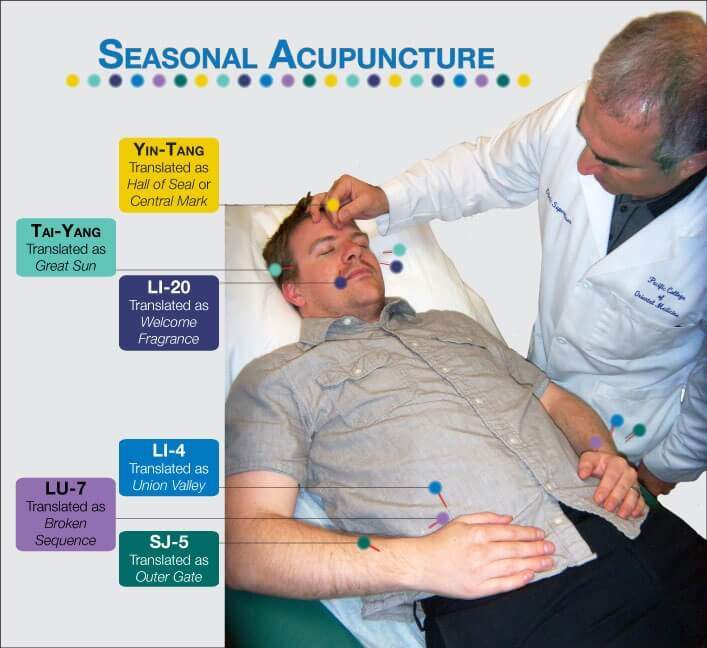Spring is officially here! And that means change right? Longer days, warmer weather, flowers blooming…just to name a few, but what about us? With all these changes going on around us, our bodies are naturally bound to react, and to prevent flu-like symptoms or other negative effects this spring, acupuncturists are recommending getting your dose of seasonal acupuncture.
Aligning Body Energy with Seasonal Change
Whenever there is a season change, according to traditional Chinese medicine (TCM) beliefs, the energy frequency of the body or a person’s “qi,” may not be in harmony with the season’s frequency. Therefore, a person’s qi may be blocked, which leads to negative side effects from bodily sickness to mood swings. Acupuncture can help unblock that qi so that the person’s energy aligns itself with the season.
In TCM, universal changes are characterized as “macro-cosms” or big changes, and our body reflects those changes with its own smaller changes, known as “micro-cosms”. Dr. Greg Sperber, director of clinical services at Pacific College of Oriental Medicine (PCOM) in San Diego, talks about these cosms and says, “We reflect the weather around us, even in a temperate climate like San Diego.”
Our bodies reflect seasonal changes in a variety of ways including simple ways like what we crave to eat. Sperber used an example: “Who wants to eat a big heavy stew in the middle of summer? No one.”
Are you interested in becoming a certified acupuncture professional?
Visit the links below to explore our specialized acupuncture programs at a campus near you:
The Role of Acupuncture in Seasonal Transitions
So we know that our bodies reflect the seasons, but why is season change the time to get acupuncture? According to TCM and Dr. Sperber, transitions like season changes are times of turmoil. People by nature are imbalanced and so these transitions, “exacerbate the imbalances in a person that are already there,” Sperber said.
People might argue, why go get a treatment for something if I’m not sick? The answer is this: prevention. Here are the top three reasons why you should come in for an acupuncture treatment at the beginning of Spring and every season, according to Sperber:
- Prevention – Help your body to not get ill in seasonal transition.
- Maintenance – If you have had issues in the past like chronic illness or allergies, this is the time to get a tune-up!
- How Acupuncture is designed – Acupuncture works better at prevention than intervention.
Spring is also associated with the “wood” element and the emotion of anger. “So if you have been feeling angry, frustrated, or depressed, it’s a great sign that you need to get in here!” Sperber said.
Feeling some anger is not always a bad thing though, according to Dr. Mohammad Javaherian, LAc at PCOM. “Some anger brings motivation, which can be a great thing. It’s all about balance,” he said.
If mood swings are more severe and allergies are a regular spring-time nuisance, herbal treatments along with acupuncture may be prescribed. According to a case study in Acupuncture Today titled “Seasonal Pollen Allergies: A Case Study,” the patient with allergies and mood swings was treated with a series of six varied acupuncture treatments and multiple herb treatments. The result: the patient has stayed symptom free for three Spring seasons now.
Sources:
- Dr. Greg Sperber, Director of Clinical Services at PCOM San Diego.
- Dr. Mohammad Javaherian, Lac at PCOM San Diego.
- Acupuncture Today, “Seasonal Pollen Allergies: A Case Study.” http://www.acupuncturetoday.com/mpacms/at/article.php?id=31485
Featured Posts:

